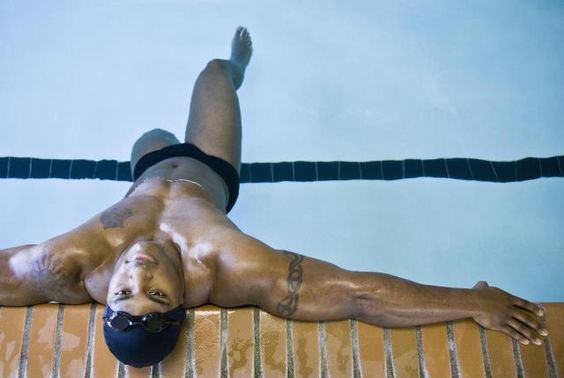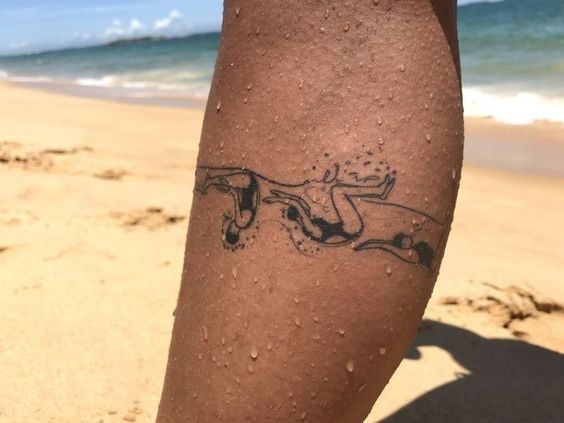Are you a tattoo lover who enjoys swimming? While getting inked is an exciting experience, it’s crucial to take care of your new artwork and protect it from water damage. After all, no one wants their beautiful design to fade or smudge! Whether you’re a seasoned swimmer or planning a beach vacation after getting tattooed, understanding how to waterproof your tattoo is essential. In this blog post, we’ll reveal some waterproofing secrets every tattoo lover should know so that you can enjoy the water without worrying about damaging your new ink.
Can You Swim After Getting a Tattoo
One of the most common questions tattoo enthusiasts ask is, “Can I swim after getting a tattoo?” The response isn’t as clear as you would suspect. While it’s not entirely forbidden to take a dip in the water, there are some essential things to consider.
Firstly, you need to remember that getting a tattoo means creating an open wound on your skin. As such, exposing it to bacteria and other harmful elements can lead to infection and slow down the healing process.
Secondly, immersing your new ink in water for an extended period can cause fading or smudging of the design. This applies whether you’re swimming in chlorinated pools or saltwater oceans.
So, how long should you wait before taking that refreshing dive? Generally speaking, experts recommend waiting at least two weeks before submerging your new tattoo in any body of water. During this time frame, keep the area clean and dry while following appropriate aftercare instructions provided by your artist.
While it may be tempting to cool off with a swim right after getting inked – don’t do it! Waiting until your tattoo is fully healed is crucial to maintaining the quality and longevity of your beautiful artwork.
How To Swim With a New Tattoo

Getting a tattoo is an exciting experience, but it’s important to take care of your new ink properly. One question that many people ask is whether or not they can swim with a new tattoo. The short answer is no – you shouldn’t go swimming until your tattoo has fully healed.
When you get a new tattoo, your skin needs time to heal and form a protective barrier over the ink. This process usually takes around two weeks, but it can vary depending on the size and location of your tattoo. During this time, it’s important to avoid exposing your fresh ink to water as much as possible.
If you must go swimming during the healing process, there are some steps you can take to protect your tattoo. First and foremost, make sure that your tattoo is covered with a waterproof bandage or wrap before getting in the water. This will help keep bacteria out of the area and prevent any damage from salt or chlorine in the water.
After swimming, be sure to rinse off any salt or chlorine from your skin thoroughly with clean water. Pat dry gently with a soft towel – never rub! Apply a thin layer of fragrance-free lotion or ointment over your tattoo to keep it hydrated and protected.
While it may be tempting to show off your new ink at the pool or beach right away, waiting until after it’s fully healed will ensure that both you and your artwork stay safe and healthy for years to come!
How Long Do You Have To Wait To Swim After Getting a Tattoo
After getting a new tattoo, it’s important to take proper care of it in order for it to heal properly. One common question that many people have is how long they should wait before going swimming after getting inked.
The answer may vary depending on the individual and their tattoo artist’s recommendations. Generally, it’s recommended that you avoid submerging your new tattoo in water for at least two weeks after getting inked.
This time frame allows the skin enough time to scab over and begin healing properly. If you go swimming too soon, the water can interfere with this process by washing away any protective ointments or causing irritation to the skin.
If you absolutely must go swimming during this period, there are some precautions you’ll need to take. You can cover your tattoo with waterproof bandages or saran wrap to keep it dry while in the water.
It’s important not only to avoid swimming but also other activities such as hot tubs or saunas until your tattoo has fully healed. These environments can harbor bacteria that could lead to infection and further complications.
It’s best practice always to follow your tattoo artist’s specific instructions regarding aftercare for optimal results.
Can You Swim In Chlorine After Getting a Tattoo

Swimming in a chlorinated pool is a common activity for many, but it’s not the best idea to do so after getting a new tattoo. Chlorine can cause irritation and dryness of the skin, which can lead to cracking and peeling of the tattooed area. This can ruin your design or slow down the healing process.
The chemicals present in chlorine can also be harmful to your immune system, increasing your risk of infection and delaying recovery time. While swimming in chlorine with a fully healed tattoo may not cause any harm, it’s still recommended that you avoid exposure until you are completely sure that your tattoo has healed.
If you must swim in chlorinated water while your tattoo is still healing, there are some precautions that you should take. Firstly, cover up your new ink with waterproof bandages before diving into the pool. Secondly, rinse off immediately after swimming to wash away any chemicals from the skin surface.
If possible it would be best to wait until your tattoos have been fully healed before jumping into chlorinated pools or hot tubs!
Swimming In Ocean After Tattoo
Swimming in the ocean is one of the most popular activities during summer. However, when you have a new tattoo, it’s important to take certain precautions before jumping into saltwater. The ocean can be particularly harsh on tattoos and may cause them to fade or even get infected.
To protect your tattoo while swimming in the ocean, make sure that it’s fully healed first. This means waiting for at least two weeks after getting inked before diving into salty water. Once your tattoo has fully healed, apply waterproof sunscreen with SPF 30 or higher to protect it from harmful UV rays and prevent fading.
Another way to safeguard your tattoo while swimming in the ocean is by wearing protective clothing like rash guards or wetsuits. These items will not only shield your skin from sunburn but also act as an extra layer of protection against sand and other abrasive materials commonly found in seawater.
Taking care of your tattoo when swimming is crucial if you want it to stay vibrant and healthy-looking for years to come. By following these simple tips on how to waterproof a tattoo for swimming, you can enjoy all kinds of aquatic activities without worrying about damaging your precious artwork!
FAQs:-
Q: Can I swim immediately after getting a tattoo?
No, it’s essential to wait until your tattoo has completely healed before swimming. Swimming too soon after getting a tattoo can increase the risk of infection and damage the tattoo’s appearance. It’s generally recommended to wait at least two to four weeks, or as advised by your tattoo artist.
Q: Are waterproof bandages safe for tattoos?
Yes, waterproof bandages can provide effective protection for tattoos while swimming. These bandages create a barrier against water, preventing it from entering the tattooed area. However, it’s crucial to choose high-quality bandages and ensure they are applied securely to avoid any complications.
Q: How often should I moisturize my tattoo when swimming?
When swimming, it’s important to moisturize your tattoo before and after each session. Applying a thin layer of tattoo-specific moisturizer helps keep the skin hydrated and protects the tattoo from the drying effects of water and chlorine. Follow the instructions provided by your tattoo artist or consult a dermatologist for personalized advice.
Q: Can I use regular sunscreen on my tattoo?
While regular sunscreen can provide some protection for your tattoo, it’s recommended to use a tattoo-specific sunscreen. Tattoo sunscreens are formulated to offer additional benefits, such as protecting the ink from fading and nourishing the skin. Look for a broad-spectrum sunscreen with a high SPF specifically designed for tattoos.
Q: How can I prevent fading of my tattoo in chlorinated pools?
To prevent fading of your tattoo in chlorinated pools, follow these steps:
- Apply a waterproof bandage or silicone-based product before swimming.
- Rinse off the chlorine immediately after swimming.
- Moisturize your tattoo regularly to keep the skin hydrated.
- Avoid prolonged exposure to chlorinated water.
Q: Can I swim in the ocean with a fresh tattoo?
Swimming in the ocean with a fresh tattoo is generally not recommended. Saltwater and its high salt content can irritate the tattooed skin and slow down the healing process. It’s best to wait until your tattoo has fully healed before swimming in the ocean. Consult your tattoo artist for specific guidance based on your tattoo’s condition.
Conclusion
Swimming with a tattoo doesn’t have to be a cause for concern. By following the proper care and waterproofing techniques outlined in this guide, you can enjoy the water while keeping your tattoo looking its best. Remember to allow your tattoo enough time to heal, cleanse and moisturize the tattooed area, and use waterproof bandages or silicone-based products for added protection. Additionally, don’t forget to shield your tattoo from the sun’s harmful UV rays by applying sunscreen. With these tips in mind, you can confidently dive into the water without compromising the longevity and vibrancy of your tattoo.





